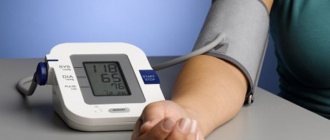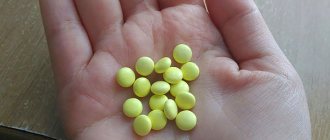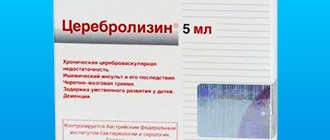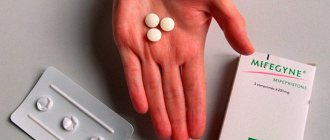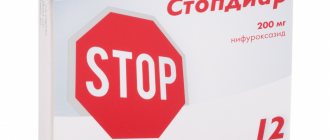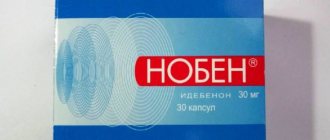Compound
The drug contains a combined active substance Co-Trimoxazole , which in turn consists of the substances sulfamethoxazole (200 mg for suspension and 100 mg (400 mg) for tablets) and trimethoprim (40 mg for suspension and 20 mg (80 mg) for tablets ).
Additional funds
For suspension: purified water, macrogol, sodium carmellose, propylene glycol, propyl parahydroxybenzoate, aluminum magnesium silicate, sodium saccharin, citric acid monohydrate, maltitol, sodium hydrogen phosphate dodecahydrate, methyl parahydroxybenzoate.
For tablets: propylene glycol, potato starch, methyl parahydroxybenzoate, talc, propyl parahydroxybenzoate, magnesium stearate, polyvinyl alcohol.
Pharmacodynamics and pharmacokinetics
Combined antimicrobial drug. The main active ingredient is Co-Trimoxazole (trimethoprim + sulfamethoxazole). What is it used for? Biseptol has a double blocking effect on bacterial metabolism. Trimethoprim has an inhibitory effect on the enzyme involved in the metabolism of folic acid and converts dihydrofolate to tetrahydroflorate. Sulfamethoxazole has a bacteriostatic effect. In combination, the components of the drug Biseptol block the biosynthesis of purines and nucleic acids, without which the reproduction and growth of bacteria is impossible.
The active substances are actively absorbed from the gastrointestinal tract. They are excreted mainly through the kidneys.
Indications for use of Biseptol
What are these tablets and suspension for?
In general, the drug is prescribed for infectious lesions of the urinary tract: pyelitis, urethritis , prostatitis , pyelonephritis , gonorrhea , epididymitis, lymphogranuloma venereum, chancroid , inguinal granuloma. Let's look at what Biseptol helps with in different parts of the body.
Indications for the use of Biseptol for gastrointestinal infections: paratyphoid , cholera , typhoid fever , cholangitis, dysentery , gastroenteritis (E. coli), cholangitis, salmonella carriage.
Respiratory tract infections: lobar pneumonia, bronchiectasis, bronchitis (acute and chronic), Pneumocystis pneumonia, bronchopneumonia .
Infections of the ENT organs: tonsillitis , sinusitis , otitis media , scarlet fever , laryngitis .
Infections of soft tissues, skin: furunculosis, acne , wound infections, pyoderma . In complex therapy it is used to treat toxoplasmosis, malaria, South American blastomycosis, and acute brucellosis.
What does Biseptol help with and indications for use?
The drug is prescribed for infectious diseases of most organs and systems, namely:
- Diseases of the gastrointestinal tract: gastroenteritis, colitis, salmonellosis, cholera, typhoid fever and paratyphoid fever.
- Otorhinolaryngological pathology: laryngitis, sore throat, otitis, sinusitis.
- Infectious lesions of the lungs and respiratory tract: acute and chronic bronchitis, pneumonia, exacerbation of bronchiectasis.
- Diseases of the genitourinary system: urethritis, cystitis, prostatitis, pyelonephritis, gonorrhea.
- Dermatological pathology: acne, boils, pyoderma.
Side effects
Nervous system: dizziness, headaches, rarely depression, aseptic meningitis , tremor, apathy , peripheral neuritis.
Respiratory system: pulmonary infiltrates, bronchospasm.
Digestive system: dyspeptic disorders, cholestasis, diarrhea, vomiting, loss of appetite, glossitis, epigastric pain, gastritis, increased levels of liver transaminases, stomatitis, pseudomembranous enterocolitis, hepatonecrosis, hepatitis.
Hematopoietic organs: megaloblastic anemia, agranulocytosis, neutropenia, leukopenia, thrombocytopenia.
Side effects from the urinary system: crystalluria, interstitial nephritis, polyuria, toxic nephropathy with anuria , oliguria, increased urea levels, hematuria, impaired renal function.
Musculoskeletal system: myalgia, arthralgia. thrombophlebitis , hypoglycemia, allergies .
Instructions for use of Biseptol (Method and dosage)
The dose of the drug in each case is prescribed by the doctor.
Biseptol tablets, instructions for use
Adults: 960 mg once, or 480 mg in 2 doses. Severe infections: 480 mg three times. Course 1-2 weeks.
For acute brucellosis, the course of treatment is 3-4 weeks, for paratyphoid and typhoid fever - up to 3 months.
Chronic infections: twice 480 mg tablets.
Instructions for use for children
For children, Biseptol is prescribed twice a day, dose from 120 to 480 mg.
At the age of 3-5 years: 2 times 120 mg per 24 hours.
Biseptol suspension, instructions for use
The syrup is used in the same way as the tablets.
Instructions for use of Biseptol
The dosage and frequency of use are prescribed by the doctor.
On average, one course of treatment for an adult patient requires 960 mg of the drug in one or two doses. Complicated infectious diseases may require increasing the duration of therapy to 1-2 weeks.
The drug is approved for use in children.
The suspension can be prescribed to babies starting from 3 months at a dosage of 2.5 to 20 ml per dose, depending on the weight and age of the child.
Tablets can be used from 3 years of age. The dosage ranges from 120 to 480 mg per day.
Overdose
Intestinal colic, dyspeptic disorders, headaches, dizziness, drowsiness, vomiting, confusion, fever, depression, hematuria , fainting, visual impairment, leukopenia, fever, crystalluria . With prolonged overdose, jaundice, megaloblastic anemia, thrombocytopenia, and leukopenia are noted. It is necessary to administer trimethoprim, calcium folinate intramuscularly at a dose of 5-15 mg/day. If necessary, hemodialysis is prescribed. There is no specific antidote.
Side effects and overdose
Taking the drug may be accompanied by the development of many unwanted reactions. Most often, dizziness, loss of appetite, dyspeptic syndrome (nausea, vomiting, stool disorders), pain in muscles and joints occur.
More rare side effects are depression, apathy, insomnia, bronchospasm, gastritis, hepatitis, agranulocytosis, anemia, nephropathy, decreased plasma glucose levels.
It is also possible to develop various allergic reactions.
An overdose can be accompanied by all of the listed symptoms. The clinic is also supplemented by an increase in body temperature, abdominal pain, the appearance of a jaundiced coloration of the skin, and disturbances in vision and consciousness.
First aid: intramuscular injection of 5-15 mg of calcium folinate and trimetropim.
Interaction
Biseptol enhances the effect of hypoglycemic drugs, indirect anticoagulants, methotrexate. The drug reduces the effectiveness and reliability of oral contraception. The risk of developing megaloblastic anemia increases when taken concomitantly with pyrimethamine (more than 25 mg per week). Thiazides may cause thrombocytopenia. The effectiveness of Biseptol is reduced by procainamide , procaine , and benzocaine . The drug leads to the development of cross-allergy when taken simultaneously with oral hypoglycemic drugs. Lack of folic acid increases with the prescription of barbiturates, phenytoin, PAS . Crystalluria develops when taking hexamethylenetetramine , ascorbic acid.
Drug interactions
Biseptol interacts with a large number of drugs. It improves efficiency:
- hypoglycemic agents;
- methotrexate;
- indirect anticoagulants.
Reduces the effectiveness of oral contraceptives.
The simultaneous use of hypoglycemic drugs and Biseptol can provoke the development of cross-allergy. And treatment with benzocaine, procaine and procainamide blocks the effect of the drug.
The interaction with alcohol has not been fully studied at the moment, so it is recommended to abstain from drinking alcohol during therapy.
special instructions
Regular monitoring of the concentration of sulfamethoxazole in the blood is necessary. If the value is more than 150 mcg/ml, then treatment is stopped until the value reaches 120 mcg/ml or lower. If the course of treatment lasts a month or more, then regular monitoring of the blood condition is required. When folic acid , hematological changes are reversible. In patients with AIDS, side effects are more common and more pronounced. Biseptol is not recommended to be prescribed for pharyngitis and tonsillitis caused by beta-hemolytic streptococcus gr. A.
Biseptol - an antibiotic or not? According to the annotation, the drug is not an antibiotic.
The recipe in Latin may look something like this: Rp: “Biseptoli-420” Dtd No. 20 in tab.
There is no description of the drug on Wikipedia.
Biseptol®
Pharmacokinetic interaction
Trimethoprim is an inhibitor of organic cation transporter 2 (OCT2), as well as a weak inhibitor of the CYP2C8 isoenzyme. Sulfamethoxazole is a weak inhibitor of the CYP2C9 isoenzyme.
Systemic exposure to drugs transported by OCT2 (eg, dofetilide, amantadine, memantine, and lamivudine) may be increased when trimethoprim-sulfamethoxazole is coadministered.
Trimethoprim-sulfamethoxazole and dofetilide should not be used simultaneously. Trimethoprim inhibits the renal excretion of dofetilide, increases the area under the concentration-time curve AUC by 103% and the maximum concentration of dofetilide by 93%. Increasing concentrations of dofetilide may cause serious ventricular arrhythmias with QT prolongation, including torsades de pointes.
Patients receiving amantadine or memantine have an increased risk of developing nervous system adverse events (such as delirium and myoclonus).
Systemic exposure to drugs predominantly metabolized by CYP2C8 (e.g., paclitaxel, amiodarone, dapsone, repaglinide, rosiglitazone and pioglitazone) may be increased when trimethoprim-sulfamethoxazole is coadministered.
Paclitaxel and amiodarone have a low therapeutic index; their simultaneous use with trimethoprim-sulfamethoxazole is not recommended.
Dapsone and trimethoprim-sulfamethoxazole may cause the development of methemoglobinemia, as there is a potential for their pharmacokinetic and pharmacodynamic interactions. Patients receiving dapsone and trimethoprim-sulfamethoxazole should be closely monitored for the development of methemoglobinemia. If necessary, alternative therapy should be prescribed. Patients receiving repaglinide or pioglitazone should be regularly monitored for the development of hypoglycemia.
Systemic exposure to drugs predominantly metabolized by the CYP2C9 isoenzyme (for example, coumarins (warfarin, acenocoumarol), phenytoin and sulfonylurea derivatives (glibenclamide, gliclazide and glipizide)) may be increased when combined with trimethoprim-sulfamethoxazole.
Blood clotting should be monitored in patients receiving coumarins. Biseptol may inhibit the hepatic metabolism of phenytoin. After administration of standard doses of trimethoprim and sulfamethoxazole, an increase in the half-life of phenytoin by 39% and a decrease in its clearance by 27% were observed. Patients receiving phenytoin should be monitored for phenytoin toxicity. Patients receiving sulfonylurea derivatives (glibenclamide, gliclazide and glipizide) should be monitored for the development of hypoglycemia.
The drug Biseptol can reduce the effectiveness of oral contraceptives. During therapy with Biseptol, women are recommended to use additional methods of contraception.
The simultaneous use of trimethoprim-sulfamethoxazole and indomethacin may cause an increase in the concentration of sulfamethoxazole in the blood plasma.
Biseptol may increase serum digoxin concentrations, especially in elderly patients, so monitoring of serum digoxin concentrations is necessary.
Pharmacodynamic interactions and interactions with unknown mechanism
The incidence and severity of myelotoxic and nephrotoxic adverse events may be increased with concomitant use of trimethoprim-sulfamethoxazole and other drugs that have a myelosuppressive effect or can cause renal impairment (nucleoside analogues, tacrolimus, azathioprine or mercaptopurine). Patients receiving such drugs concomitantly with trimethoprim-sulfamethoxazole should be monitored for the development of hematologic and/or renal toxicity.
Concomitant use with clozapine should be avoided, since the latter is known to cause agranulocytosis.
In elderly and senile patients, with the simultaneous use of certain diuretics (mainly thiazide), an increase in the number of cases of thrombocytopenia was observed.
In patients receiving diuretics, platelet levels in the blood should be regularly monitored.
Patients receiving trimethoprim-sulfamethoxazole and cyclosporine after renal transplantation may experience a reversible deterioration in renal function.
Sulfonamides, including sulfamethoxazole, may compete for protein binding and renal transport of methotrexate, thereby increasing free methotrexate concentrations and systemic effect.
Cases of pancytopenia have been described in patients taking trimethoprim and methotrexate. Trimethoprim has low affinity for human dehydrofolate reductase, but may increase the toxicity of methotrexate, especially in the presence of risk factors such as old age, hypoalbuminemia, renal impairment, bone marrow suppression, and in patients receiving high doses of methotrexate. To prevent myelosuppression, such patients should be prescribed folic acid or calcium folinate.
It can be assumed that when trimethoprim-sulfamethoxazole is co-administered to patients receiving pyrimethamine for malaria prophylaxis in doses greater than 25 mg per week, they may develop interregional anemia. Caution must be exercised during the simultaneous use of trimethoprim-sulfamethoxazole and drugs that increase the concentration of potassium in the blood serum (such as ACE inhibitors, angiotensin receptor blockers, potassium-sparing diuretics and prednisolone), due to the potassium-sparing effect of trimethoprim-sulfamethoxazole.
In addition to other drugs that may cause hyperkalemia, the combined use of trimethoprim-sulfamethoxazole (co-trimoxazole) and spironolactone may result in clinically significant hyperkalemia.
Laboratory research
Trimethoprim-sulfamethoxazole and, in particular, trimethoprim, which is part of it, may affect the results of determining the concentration of methotrexate in serum, carried out by the competitive protein binding method using bacterial dihydrofolate reductase as a ligand. However, when methotrexate is determined by the radioimmune method, there is no influence.
Trimethoprim and sulfamethoxazole can also affect the results of the Jaffe test (determination of creatinine by reaction with picric acid in an alkaline medium), and in the normal range the results are overestimated by approximately 10%.
Biseptol for children
It is noted that the drug can be used from 3 months of life; naturally, the doses will vary. However, this should be done with caution and only as directed by a doctor. In some countries of the world, Biseptol for children is allowed to be used only from 12 years of age.
Usually they can prescribe a suspension from 3 months, tablets from 2 years.
Instructions for Biseptol for children
At the age of 3 to 6 months, 2.5 ml of syrup is prescribed 2 times a day. The interval between doses should be at least 12 hours. From six months to 3 years, take up to 5 ml of Biseptol suspension for children twice a day.
From 3 to 6 years, the dosage is made equal to 5-10 ml twice, 6-12 years - 10 ml 2 times a day. From 12 years of age, take 20 ml every 12 hours.
How to take pills for children?
At the age of 2-5 years: 2 times 120 mg per 24 hours. From 6 to 12 years, use 480 mg every 12 hours.
The course of treatment is 5-7 days. When using drugs for children, you should drink plenty of water.
BISEPTOL - an antibiotic or not?
Representative office of Polpharma SA
Antibiotics are drugs based on substances produced by microorganisms or obtained by semi-synthetic methods. There are also synthetic drugs - these are artificially created substances with a similar effect; they are combined under the general term “antibacterial drugs”.
In popular scientific literature, the term “antibiotic” is often used to refer to all antimicrobial agents.
Some people categorically do not use antibiotics; in others, the body responds to their use with allergic reactions. What should such patients do if they need to cope with an infection? There is one remedy that has been tested by time and the practice of pediatricians. This is BISEPTOL suspension.
The active component of BISEPTOL suspension is co-trimoxazole. This is a product that destroys pathogenic microflora. Co-trimaxozole consists of two components, which, on the one hand, disrupt important life processes occurring in the cells of harmful microbes, and on the other, activate the production of substances that suppress the proliferation of microbes.
BISEPTOL is an antibacterial drug, but not an antibiotic.
BISEPTOL suspension can help destroy pathogens such as staphylococci, streptococci, salmonella, Haemophilus influenzae, Shigella, Legionella, Proteus, Brucella, Neisseria, mycobacteria and many others.
A special form of BISEPTOL for children is produced in Poland, part of the pharmaceutical industry. This suspension has a strawberry flavor, does not contain sugar and can be used in children from the age of three months.
In what cases can children be prescribed BISEPTOL suspension?
BISEPTOL suspension is used for such infectious and inflammatory diseases as inflammation of the bronchi and lungs, inflammation of the middle ear, tonsils, paranasal sinuses, larynx, kidney disease, urinary tract and intestines. BISEPTOL will also help with infections localized in the digestive tract, as well as with infectious skin lesions, furunculosis and purulent wounds. BISEPTOL is effective even in case of infection that has settled deep in the bone tissue.
Who is not recommended to take BISEPTOL suspension?
If your child has an individual intolerance to a number of sulfonamides or very severe kidney and liver diseases, blood diseases or streptococcal tonsillitis, then BISEPTOL suspension should not be taken.
How to take BISEPTOL suspension?
BISEPTOL suspension is taken after meals in the morning and evening.
The dosage depends on the disease and the age of the patient.
One measuring cap holds 10 ml. with divisions into 2.5 ml 5 ml, 7.5 ml and 10 ml, which is very convenient for parents.
BISEPTOL suspension is prescribed to children starting from three months.
Warning!
It is not advisable to treat babies with BISEPTOL for less than three days. When all the manifestations of the disease completely disappear, you need to take BISEPTOL for two more days, that is, only 5-7 days, but the duration of therapy should always be determined only by the attending physician.
Special instructions
If your child takes BISEPTOL suspension, then it is advisable to adjust his diet. Try to give him more fluids and not give him a lot of green leafy vegetables, cabbage of all kinds, peas and beans, as well as tomatoes, carrots, desserts and baked goods. This is due to the fact that BISEPTOL improves the functioning of the kidneys and intestines.
During treatment with BISEPTOL, support the baby’s body with vitamins approved by the attending physician. For example, ascorbic acid in CEVICAP .
“CEVIKAP” is the only form of ascorbic acid in drops specially designed for children, has a pleasant taste and is accepted with pleasure by children.
Just a few drops a day, depending on age, will significantly strengthen your child’s immunity. "CEVIKAP" - with love and care for the baby.
For more information contact:
| Telephone | (99871) 150-21-72, 150-21-73, 150-21-74 |
| Fax | (99871) 150-21-77 |
| [email protected] | |
| WWW | polpharma.com |
| Address | Tashkent, Mirabad district, st. Anton Chekhova, 32, floor 7 |
Representative office of Polpharma SA
Biseptol's analogs
Level 4 ATC code matches:
Biseptol 480
Co-trimoxazole
Bactrim
Analogues are the following drugs: Bactiseptol , Bactrim , Biseptazol , Biseptrim , Groseptol , Co-Trimoxazole , Oriprim , Raseptol , Solyuseptol , Sumetrolim , Triseptol .
Reviews of Biseptol
The product is very effective, especially for respiratory diseases. Has an excellent antibacterial effect. Among the disadvantages, it should be noted that there are sometimes side effects. Should not be used without the direction of the attending physician.
Biseptol for children, reviews
It is considered a very effective means of combating microbes. There are generally no negative reviews when treating children with Biseptol syrup.
Reviews of Biseptol for cystitis
The drug is effective against cystitis, but do not forget about the side effects.
For sore throat
Prescribed when it is impossible to take antibiotics. According to research, microorganisms that cause sore throat have begun to lose sensitivity to this drug.
Biseptol price
The price of Biseptol in 120 mg tablets is 35 rubles for 20 pieces. You can buy 480 mg tablets for 100 rubles per pack of 28 pieces.
The price of Biseptol syrup is approximately 130 rubles.
- Online pharmacies in RussiaRussia
- Online pharmacies in UkraineUkraine
- Online pharmacies in KazakhstanKazakhstan
ZdravCity
- Biseptol tab.
480 mg n28 JSC "Adamed Pharma" 100 rub. order - Biseptol tab. 120 mg n20 JSC "Adamed Pharma"
34 RUR order
Pharmacy Dialogue
- Biseptol suspension (vial 240mg/5ml 80ml)Medana
129 RUR order
- Biseptol 480 tablets 480 mg No. 28Polfa
88 rub. order
- Biseptol 120 tablets 120 mg No. 20Polfa
33 rub. order
- Biseptol 480 ampoules 5ml No. 10Polfa
436 rub. order
show more
Pharmacy24
- Biseptol 480 No. 14 tablets Pub Yanitsky FZ, Polfa A.T., Poland
76 UAH.order - Biseptol 100/20 mg No. 20 tablets Pub Yanitsky FZ, Polfa A.T., Poland
43 UAH order
- Biseptol 480 mg 5 ml N10 Warsaw Federal Plant, Poland
263 UAH order
- Biseptol 480 N20 tablets Pub Yanitsky FZ, Polfa A.T., Poland
88 UAH order
PaniPharmacy
- Biseptol infusion Biseptol solution d/in. 480mg amp. 5ml No. 10 Poland, Warsaw Federal Law
271 UAH order
- Biseptol liquid Biseptol suspension for oral use bottle 80ml Poland, Medana Pharma SA
119 UAH order
- Biseptol tablets Biseptol tablets 480 mg No. 20 Poland, Pabianicki Federal Plant Polfa
96 UAH order
- Biseptol tablets Biseptol tablets 120 mg No. 20 Poland, Pabianicki Federal Plant Polfa
45 UAH order
- Biseptol tablets Biseptol tablets. 480 mg No. 14 Poland, Pabianicki Federal Plant Polfa
75 UAH order
show more
